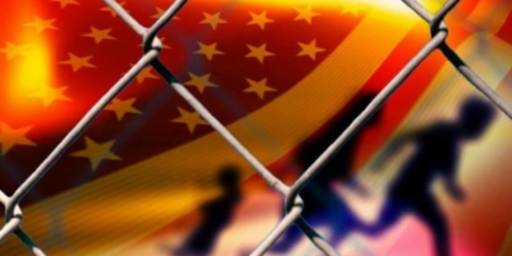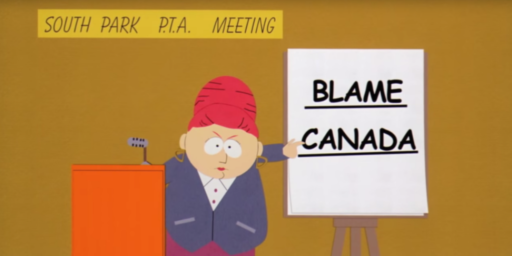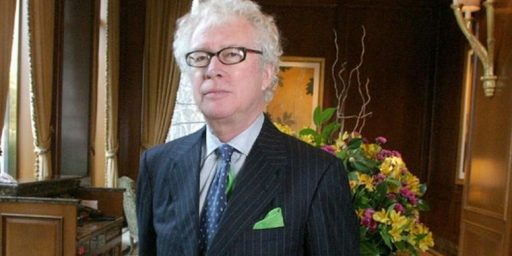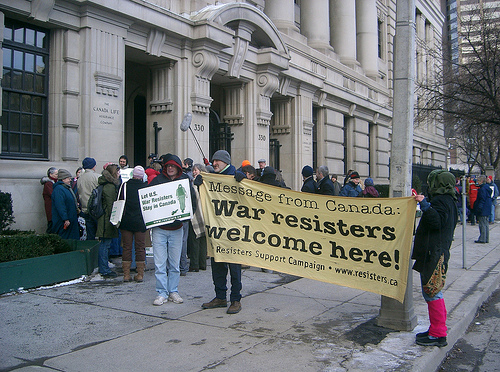New Generation of American Deserters in Canada
Some Vietnam era American draft dodgers who still live in Canada are now heading up an “underground railroad” of sorts for American deserters, Asharq Al-Awsat reports.
When 26 year old Lee Zaslofsky bid his parents farewell as he prepared to flee to an unknown future in Canada, rather then serve in a war he did not believe in, little did he know that three decades later he would be at the forefront of a campaign to help a new generation of US soldiers flee a war and seek asylum in Canada. The US Army is facing difficulties in recruitment; the monthly number of army volunteers is at its lowest in years, in addition to an increasing number of soldiers opting to go north to Canada rather than east to Iraq. After evading the Vietnam War by seeking refuge in Canada in January 1970, where he has remained since; Zaslofsky is now trying to help soldiers who have made the same choice with regards to the war in Iraq.
“I never expected this to happen in my country again,” Zaslofsky told Asharq Al-Awsat in reference to the US being embroiled in a long war that lacks public support. Zaslofsky, speaking from Toronto, added, “Many of these American soldiers decide against fighting in this war, like they did with Vietnam, because they feel sorry for what they’ve seen happen to the people there. They prefer the hard choice of leaving their country for good rather than being involved in this war.”
Since 2004, Zaslofsky has been working with the War Resisters Support Campaign, a non-governmental organization (NGO) that aims to help American soldiers fleeing to Canada and protect their rights. With approximately 75 volunteers, Zaslofsky explained that the campaign, “aims to help those (soldiers) who arrive in Canada in several ways: we provide them with material aid and give them legal advice and provide them with housing at the houses of volunteers.” He added that, “the other part of our work is the important political work, raising awareness in the media and pushing the Canadian government to allow them to stay here.”
I must say, it’s a fascinating concept: A neighboring ally harboring criminal deserters from our all-volunteer armed forces. It appears, however, that the Canadian government, while apparently not going out of its way to stop this, is not providing active support.
In March 2005, Hinzman applied to be discharged or reassigned as a Conscientious Objector (CO) against the war in Iraq, but the IRB did not consider the reason sufficient to grant him asylum in Canada. The Supreme Court of Canada is expected to consider Hinzman’s case this fall. If the Supreme Court were to agree to hear his case then the issue of US soldiers seeking asylum in Canada will become a wide-spanning judicial one that will compel the IRB to look into more cases. However, until this time comes, Hinzman, like other US soldiers, will continue to await a change in Canadian policy.
It is worth noting that between 1965 and 1973, over 50,000 Americans who were within the conscription age during the Vietnam War moved to Canada to dodge the draft. Adopting a stance against the war, Pierre Trudeau, the Canadian prime minister stated, “Those who make the conscientious judgments that they must not participate in the war… have my complete sympathy,” confirming that, “Canada should be a refuge from militarism.” However, the incumbent Canadian government, led by Stephen Harper’s Conservative Party, and who is close to President George W. Bush, does not want to open its doors to fleeing US soldiers.
Despite the Canadian government’s caution to maintain good relations with the US administration, there is public pressure and demands to let the American troops remain in Canada. According to a poll published last August 16, 64.5 percent of the population of Ontario, one of Canada’s largest provinces, voted in favor of allowing the US troops to stay in Canada, while 27.2 percent voted that they be repatriated back to the United States, and the rest were unsure.
What’s interesting is the U.S. Government isn’t doing much on this front, either.
The US Department of Defense refused to comment on the issue of US soldiers in Canada; however, a spokesperson said that, “In 2006 there was a slight increase from previous years”. Regarding the consequences of sending soldiers to the US after going AWOL, she said “each case is evaluated on an individual basis, but the policy is to return most deserters to their unit because those commanders are in the best position to address the soldiers’ specific issues.” Moreover, she explained that, “the army does not actively look for deserters, but they can be returned to military control by civilian law enforcement. This normally happens when police check identification during a traffic stop.”
One would think a somewhat more proactive response would be called for.
Most of those who fled to Canada in the Vietnam era were civilians trying to avoid military conscription, whether out of genuine conviction or simple cowardice. These people, however, volunteered for military service and swore an oath to serve.
via email alert from John Burgess






What’s also fascinating is the idea of criminal sanctions for leaving a “volunteer” army.* It sounds decidedly less volunteer-like at that point.
*not that this is my first brush with the concept, of course.
Somehow I doubt that the military want them back in the ranks and if they go after them, they have to spend resources to deal with them, both in tracking them down and then trying them in a court, keeping them incarcerated, etc. Better to just write them off and go on without them.
I remember when I got my induction notice in 1972, I really didn’t have a problem with those who chose to leave their home country with the knowledge they’d likely never return home. Not something I even considered but at least they were sacrificing something. It was the politically connected who got the rare slots in the guard and reserve that I couldn’t stomach.
It is different with volunteers nowadays leaving for Canada, but I’m not sure how different at this stage of the game with 65 percent of Americans wanting the soldiers to come home soon.
So how many deserters are Zaslofsky and his 75 volunteers helping? It seem like if it was a large number, it would be in the interview.
I wonder if Zaslofsky confirms the status of these deserters. It would be a good way to get help relocating to Canada if someone was low on cash.
This topic highlights the really incredible number of draft dodgers of one stripe or another who started this war.
No more beer for bush/cheney!
I don’t think it is really in the interest for the Canadians to spend much to help find these deserters. Its not like they are hurting Canada and we certainly aren’t going to cut trade with the Can-cans over something like this.
There is no incentive for Harper to help us on this.
But did they volunteer for this? Endlessly repeating tours in a hell hole of a warzone fighting a war they can not win to shore up a delusional egomaniacs standing in history? I think not.
Here is what they did swear to:
I, (NAME), do solemnly swear (or affirm) that I will support and defend the Constitution of the United States against all enemies, foreign and domestic; that I will bear true faith and allegiance to the same; and that I will obey the orders of the President of the United States and the orders of the officers appointed over me, according to regulations and the Uniform Code of Military Justice. So help me God.
Yeah I know… There is that little clause about “obey the orders of the President of the United States”… But there is also that previous (and superceding) clause about “defending the Constitution of the United States against all enemies foreign and domestic;..” not to mention “bearing true faith and allegiance to the same”…
tom
Tom, if you don’t uderstand the meaning of “obey” well, then I can understand your confusion. If you can name something that has been done contrary to the Constitution of the US, then I will agree with you.
The men and women who signed up for the service and took the coin of the realm during peace time knew there could come a time to earn it. They don’t get to choose either the time or place. Now is the time. The Middle East is the place.
Well until such time as the Constitution has been completely thrown out the window, we in the military are required to execute the orders of the President (agree with them or not) and the officers appointed over us. We are all free to disobey an unlawful order but we do so at our own peril in other words, if you choose to disobey an order because you feel it is unlawful, you better be right.
TomP: Yes we did sign up for this. You prompted me to look at my enlistment contracts (I’ve signed five of them now) and if you flip over page one it says plain as day:
“A. My enlistment is more than an employment agreement. As a member of the Armed Forces of the United States I understand that I will be:”
“(1) Required to obey lawful orders and perform all assigned duties.”
(2) Stuff about not being guaranteed an honorable discharge at the end of my enlistment.
(3) That I’m subject to the UCMJ.
“(4) may be required upon order to serve in combat or other hazardous situations.”
Again, yes we did sign up for this. Things could be worse this could be like WWII where the troops deployed in 1942 and didn’t come home until 1945 or later in some cases.
We can win this war if people would quit trying to convince the enemy that they have already won it. Everytime someone spout off with “the war is lost” the enemy gets a morale boost.
Excellent post up until this part. It seems to me that morale isn’t needed to convince someone to strap on an explosive vest. Unless we’re not talking Al Qaeda, in which case you’ll need to specify which enemy we’re supposedly boosting the morale of.
In related news, while driving home this evening I happened upon 3WT Radio (107.7 FM in D.C. Metro area) and heard talk show host Randi Rhodes actually encouraging those of us in the military to actually go AWOL (UA for the Navy and Marine Corps) and go to Canada, even offering to help those that wanted to go. Incredible!!! Opposing the war is one thing but actually encouraging someone to commit a crime (it is still a crime to violate Article 86, UCMJ) as your chosen form of protest is really out there. What is more she was in the Air Force Reserves in the 1970’s as a crew chief so she knows better.
Michael: We are talking about Al Qaida. You’re right that they don’t need morale to strap on a vest. My point is the leadership of AQ and all the other enemies over there for that matter, after watching the news or hopping on the internet, have to be thinking “Just one more martyr and we can make the Americans quit and go home”. We have defeated them militarily everytime they’ve dared to stand and fight. They cannot defeat us with suicide bombers alone unless we let them.
What we haven’t done is convinced them their cause is lost and they should pack it in and fight another day. We haven’t been able to crush their morale in other words. PART of the reason for that has got to have something to do with the anti-war movement in this country screaming that we have lost the war.
Speaking of oaths, and the people who break them, you can make a pretty strong argument that Bush has not kept his oath to uphold the constitution. Where is the outrage on the right?
Anjin-san: I’m not sure about that. If President Bush has not kept his oath to uphold the Constitution, then doesn’t the 435 members of the House of Representatives have a duty to impeach him? Don’t the 100 Senators then have a duty to vote to convict? Sounds like their not upholding their oaths either. Where does it end?
You obviously have never heard the phrase “two wrongs don’t make a right”. What the President does or doesn’t do in terms of his oath has ABSOLUTELY nothing to do with whether I uphold mine.
In normal parlance, “contracts” can be broken without criminal punishment. What you signed was not a “contract” in the normal sense of the word.
And what exactly has the AQ leadership done to make you think they want the Americans to quit and go home? Do you think they want an Iranian-backed Shia government in Iraq? Because that’s what they would get if we leave.
No, I find it far more likely that Al Qaeda wants out troops to stay so they can fight Iran’s advances under the popular anti-american banner, while being provided an endless supply of American ducks in the proverbial barrel to keep the masses from realizing that this is really a Muslim on Muslim existential conflict in their back yards.
While US forces may have laws that prohibit the kind of tactics that could actually rout AQ from Iraq, Iran’s revolutionary guard would have no such qualms.
Dale,
Please show me where I said that Bush’s betrayal of his oath excuses anyone else’s actions. You have obviously never heard the expression “don’t put words into other people’s mouths”.
I am simply expressing my astonishment that the right expects so much from young people who are being sent to die in a war that was based on a lie and beyond that, bungled from day one, and so little from the President of the United States.
While there is political disagreement as to the entering and conduct of the war, no breach of office by the President has been determined. Whereas, desertion is an absolute and inarguable default of the contract or commission of a military member. I fail to see the difference of in expectation.
Many seem to think that their “understanding” of the Constitution is the governing interpretation but in reality no interpretation matters but the Supreme Court’s interpretation. The President has wide latitude to take any and all actions not specifically prohibited by the Constitution or law in the execution of his office. When their is dispute over the powers granted the President or interpretation of a law, the Supreme Court is the adjudicating body. Whereas, a military member is governed by the UCMJ as enacted by Congress in accordance with the Constitution, which specifically prohibits desertion and specifies punishment.
I fail to see where the “young people” in the military are expected to do more than the President, both are being held to fulfill the office they voluntarily entered.
A common failing during the Bush era, with tragic results…
It seems to me that many of our citizens, having found a distaste for Bush, the war, and the military, have decided to try to fuzzy up the clear duties and obligations of a volunteer. Desertion is punishable by death in war time. Desertion is what many are committing when they sign up for military duty, yet decide to run to Canada when the shooting war comes near to them personally.
We have been very, very lenient with such deserters in the past by giving them amnesty when they return to the US after the conflict is over.
That is a mistake. The new deserters see how others have been absolved of their sins, and thus know that they too will not serve time–or be shot, in the long run–and can count on returning to the US eventually.
Deserters that return should get 10 to 15 years in a federal prison, with no time off for good behavior. It matters little, the reasons for desertion; the crime has been committed, so the time must be done. Or, these deserters can simply be written off and barred from ever returning. That seems to be the current solution.
It seems strange that someone would desert a volunteer army, but remember that these days they will hold on to you as long as they legally can, and stretch the definition of that, to swell the ranks, and that the world has changed pretty quickly. I was very close to enlisting after 9/11, and what stopped me is that I knew that Bush was likely to use the armed forces to do things that were completely insane and unhelpful to actually making the U.S. safer, which makes participation less of a useful service (though no less honorable, from an individual standpoint). Lo and behold, he did just that, and a lot of people must be feeling whiplash.
people change their mind………….
under duress to follow through, it takes great courage of conviction to change your mind…..
not too difficult to understand……
Someone may join and take an oath in *any* organization long before they become aware of the realities of what they’ve agreed to. I’m sure KKK had an oath.
Each man must test his conscience at each point in his growth. A father may begin by beating his children; later he may realize there are less brutal ways.
If a man chooses in good conscience, after reflection, not to serve further, who is the judge and jury to decide his truth is wrong? Who is to decide for me whether a war is just? Who is to decide whether leadership has been conniving and disingenuous?
It is certainly a human right to be able to change one’s mind. But, having sworn an oath or having signed a contract, one has to deal with the consequences of a breach of that oath or contract.
Crossing the border to escape the penalties that follow a bad decision isn’t exactly facing up to the consequences, is it?